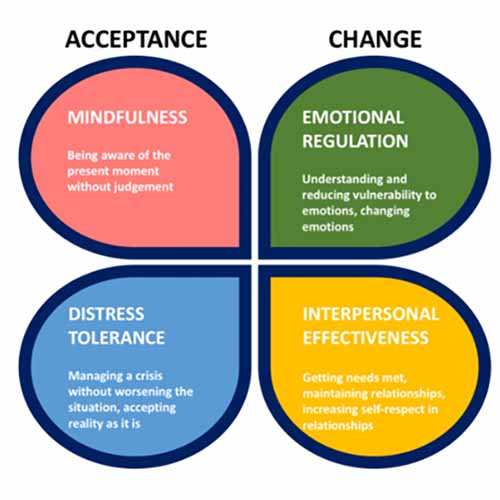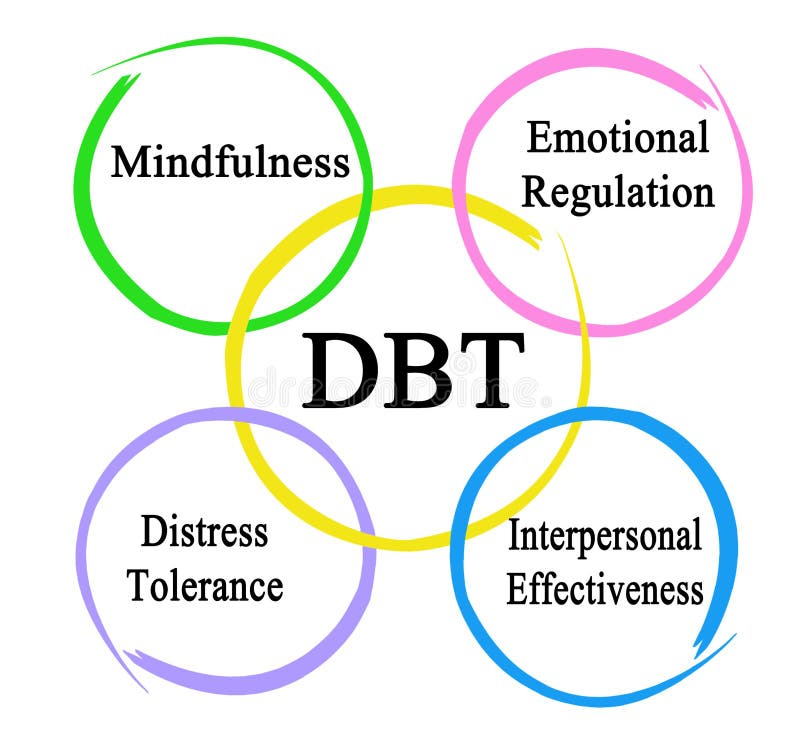Changing Lives: DBT London's Holistic Method to Recovery
Changing Lives: DBT London's Holistic Method to Recovery
Blog Article
Harnessing the Power of Dialectical Practices Treatment (DBT) Services for Lasting Psychological Balance and Improved Relationships
In a world where psychological well-being and keeping healthy relationships are vital components of a fulfilling life, the utilization of Dialectical Behaviour Treatment (DBT) services has actually become a beacon of expect several people. The evidence-based and structured method of DBT provides a path towards lasting emotional balance and boosted interactions with others. By focusing in on core principles, individuals can develop vital skills for controling feelings, improving interpersonal performance, and promoting mindfulness. The real power of DBT exists not simply in understanding these ideas but in the sensible application of techniques in day-to-day life. As we navigate the intricacies of human emotions and relationships, using the capacity of DBT solutions becomes a transformative trip worth checking out even more.

Comprehending the Core Principles of DBT
Dialectical Habits Treatment (DBT) is founded upon a collection of core concepts that underpin its therapeutic approach to promoting psychological balance and psychological wellness. Mindfulness is another core concept of DBT, concentrating on being totally present in the minute without judgment.

Validation is likewise essential to DBT, emphasizing the relevance of accepting and recognizing one's experiences and emotions as legitimate. By incorporating these core concepts into treatment, DBT provides a thorough and reliable approach to advertising emotional health and mental resilience.
Creating Psychological Policy Abilities
Psychological policy skills are necessary parts of Dialectical Behavior modification (DBT) that allow people to effectively handle their emotions and navigate difficult circumstances with resilience. These skills encompass the ability to recognize and comprehend one's feelings, endure distress, manage extreme sensations, and act according to personal values also despite emotional chaos. Establishing psychological policy skills involves learning mindfulness methods to stay present in the moment, understanding the triggers that cause psychological dysregulation, and executing coping methods to regulate psychological actions.

Enhancing Interpersonal Effectiveness
Improving communication abilities and cultivating purposeful connections with others are essential aspects of creating interpersonal effectiveness within the structure of Dialectical Habits Therapy (DBT) In DBT, boosting interpersonal efficiency involves discovering exactly how to assertively share one's needs and limits while also thinking about the demands and boundaries of others. This skill is critical for building healthy partnerships and reducing conflict. DBT shows people how to connect efficiently, navigate social challenges, and establish strategies for solving problems in a constructive fashion.
One trick element of improving interpersonal effectiveness in DBT is finding out to identify and take care of feelings in social interactions. DBT London. By boosting emotional understanding, people can react to others in a more empathetic and understanding method. Furthermore, DBT stresses the significance of exercising mindfulness in interpersonal connections, motivating people to be present in their interactions and completely involve with others
Exercising Mindfulness Techniques
Developing a consistent mindfulness method is important for people going through Dialectical Habits Therapy (DBT) to cultivate emotional guideline and enhance their interpersonal effectiveness. Mindfulness techniques, a core element of DBT, include taking notice of today moment without judgment. With mindfulness, people can come to be more knowledgeable about their thoughts, feelings, view publisher site and physical feelings, permitting them to respond to scenarios with higher quality and control.
One key mindfulness method used in DBT is mindfulness meditation. This technique involves concentrating on the breath or a certain object while allowing and recognizing go of any type of distracting ideas. By incorporating mindfulness meditation right into their daily regimen, people can educate their minds to remain existing and lower sensitivity to stressors.
Another essential element of exercising mindfulness in DBT is the principle of radical acceptance. Radical acceptance involves fully welcoming reality as it is, also when it is unpleasant or difficult. By accepting the present moment without judgment, people can lower their suffering and make room for favorable change.
Applying DBT Methods in Daily Life
Building upon the foundation of mindfulness methods such as reflection and extreme acceptance, people can incorporate DBT strategies into their every day lives to promote psychological equilibrium and improve their interpersonal skills. One reliable DBT method is using dialectics, which urges individuals to discover the center ground in between two opposing emotions or ideas. By practicing dialectics in day-to-day communications, people can learn to verify their own sensations while likewise taking into consideration the perspectives of others. An additional vital DBT skill for life is distress resistance, which entails finding out exactly how to deal with intense emotions without considering dangerous behaviors. This can be achieved through techniques such as self-soothing tasks, disturbance strategies, or enhancing the moment. Additionally, social performance webpage skills taught in DBT can help people connect their needs assertively, set limits, and keep healthy and balanced connections. By regularly using these DBT strategies in every day life, people can experience lasting emotional equilibrium and improve their overall wellness.
Conclusion

Psychological law skills are essential components of Dialectical Behavior Therapy (DBT) that make it possible for people to efficiently handle their feelings and navigate tough circumstances with resilience.Through DBT solutions, people can cultivate a much deeper understanding of their emotions, recognize patterns of actions that add to psychological distress, and get functional tools to control their feelings constructively.Establishing a consistent mindfulness practice is necessary for people undertaking Dialectical Actions Therapy (DBT) to cultivate emotional law and improve their interpersonal performance.Structure upon the foundation of mindfulness techniques such as reflection and extreme acceptance, individuals can incorporate DBT techniques into their everyday lives to cultivate psychological equilibrium and boost their interpersonal skills. By comprehending the core principles of DBT, establishing psychological regulation abilities, enhancing interpersonal performance, practicing mindfulness methods, and using DBT strategies in everyday life, people can experience considerable renovations in their general well-being and relationships.
Report this page